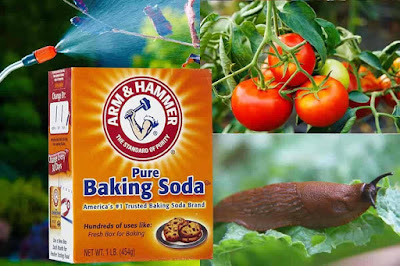15 Highly effective uses of baking soda for plants and garden:
1. Baking soda is highly effective in killing cabbage worms that destroy the foliage of brassica varieties.
How to use baking soda to kill cabbage worms?
Just mix equal quantities of flour and baking soda and sprinkle the mixture on the leaves. The worms will eat it and soon will die.
2. Baking soda is also used to enhance the taste of tomatoes, mostly when grown in acidic soil.
How to use baking soda to grow sweeter tomatoes?
Slightly dig around the base of the tomato plant and add the baking soda directly to the soil. Mix it well along with the soil and this will lower the acidity level of the soil thus giving rise to sweeter tomatoes rather than the tart-tasting ones.
3. Baking soda or sodium bicarbonate is also used to make your plants bloom. It enhances the blooms in your flowering plants and vegetable plants.
How to use baking soda to enhance the blooms in the plants?
1 table spoon of baking soda in 2 quarts of water when sprayed on the plants will encourage blooming.
4. Baking soda will make your dull looking plants become lush green.
How to use sodium bicarbonate to grow lush green plants?
A mixture of 1 spoon baking soda, 1/2 spoon of ammonia and 1 spoon epsom salt in 1 gallon of water will help to boost your plants. This fertilizer will turn your dull looking plants into lush green one.
5. Baking soda is also highly effective in preventing fungal diseases and mildew.
Why baking soda prevents fungal diseases?
Baking soda makes the surface less acidic and hence prevents the fungal spores from multiplying and growing.
Protip 1: This preventive treatment of baking soda can be used in your vegetable garden, fruit plants, flowering plants, trees, bushes, vines and any kind of plants in your garden.
How to use baking soda to prevent fungal diseases?
Mix 1 teaspoon of baking soda in 1 litre of water and also add few drops of liquid soap to the solution. Mix it thoroughly and spray it on the plants.
Protip 2: Do not use this only on infected plants. It can be used on a regular basis for all your plants, as this prevents the formation of fungal spores.
6. Baking soda is used as an effective insect repellant in the garden.
How to use baking soda as insect repellant in the garden?
Make a paste of 1 teaspoon baking soda in 1/3 cup of oil (mostly mustard oil or olive oil is preferred) and then dilute it in 1 litre of water. Spray this solution on the plants and soil.
Protip 3: Use this mixture once a month and it is highly effective in repelling aphids, spider mites and scales.
7. Get rid of gnats with the help of baking soda.
How to kill gnats using baking soda?
Gnats which are most common in your compost bin or in the pile of leaves are a great nuisance and these can be prevented by using 2 teaspoon baking soda in 1 litre of water along with biodegradable soap. Mix all these three and spray them on the infected area.
8. Insects like roaches and silverfish that dwell under the soil can be easily dissipated using baking soda.
How to get rid of insects under the soil?
Take a handful of baking soda and sprinkle it on the area where you commonly find these insects buried under the soil. This will deteriorate the insects slowly until they disappear completely.
9. Baking soda is one of the useful soil testing kits that can be used to test the pH of your garden soil, free of cost.
How to use baking soda to test the pH of the soil?
The pH of the soil can be tested by taking the garden soil mixing it in water to make a clay or mud form. Then sprinkle some baking soda in the soil. If the soil bubbles, then it is acidic.
Protip 4: Always take the garden soil from about 6 inches deep from the ground level for testing the pH.
Protip 5: If the soil doesn't bubble upon adding baking soda, it doesn't mean that soil is alkaline in nature. It can be either alkaline or neutral. To test it further just use the same process of mixing garden soil in water until it forms mud and then add a tablespoon of vinegar. If the soil is alkaline in nature, there will be bubble formation, upon the addition of vinegar. If the soil is neutral, the soil will not bubble for the addition of both baking soda and vinegar.
10. Get rid of ants in your garden with the help of baking soda.
How to use baking soda to get rid of ants in the garden?
Ants which are the most common nuisances in the garden can be get rid of by adding 2 to 3 spoon of baking soda in 1 litre of water and pouring it in the soil where you find the anthills.









